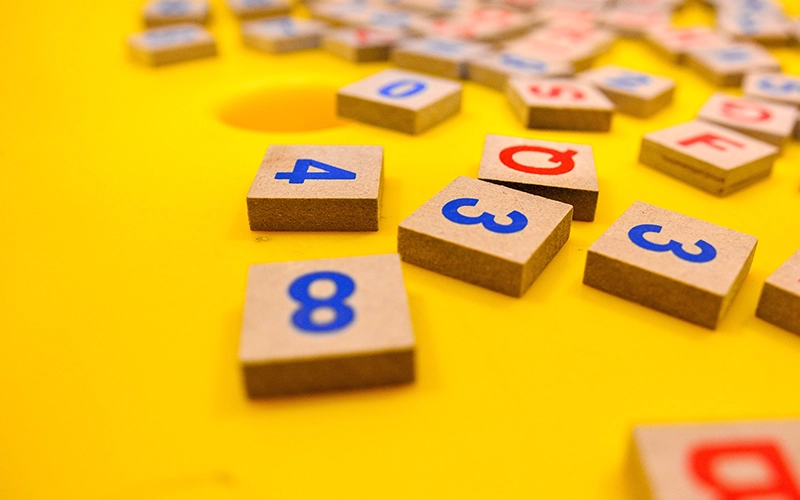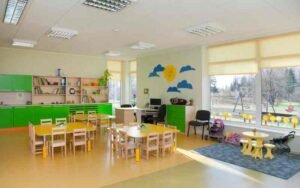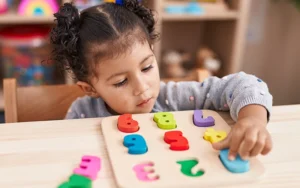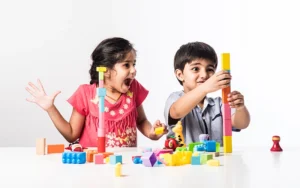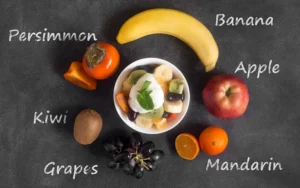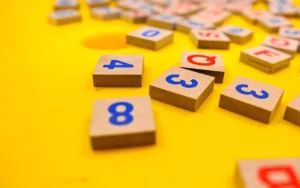Unlike the old times the education today has evolved to be interactive and innovative. It is the need of the time to grab the attention of your children and keep them engaged in a learning journey by using various tools and techniques. One such technique is to make them hooked to the numbers right from the foundation level to achieve a foundational milestone.
One such foundational milestone is understanding numbers in early education and distinguishing between even and odd numbers at the formative stage of education. We at Rainbow Pre-school believe that learning should be fun, engaging and age-appropriate, especially for preschoolers who have just started the journey of education to explore the world of numbers.
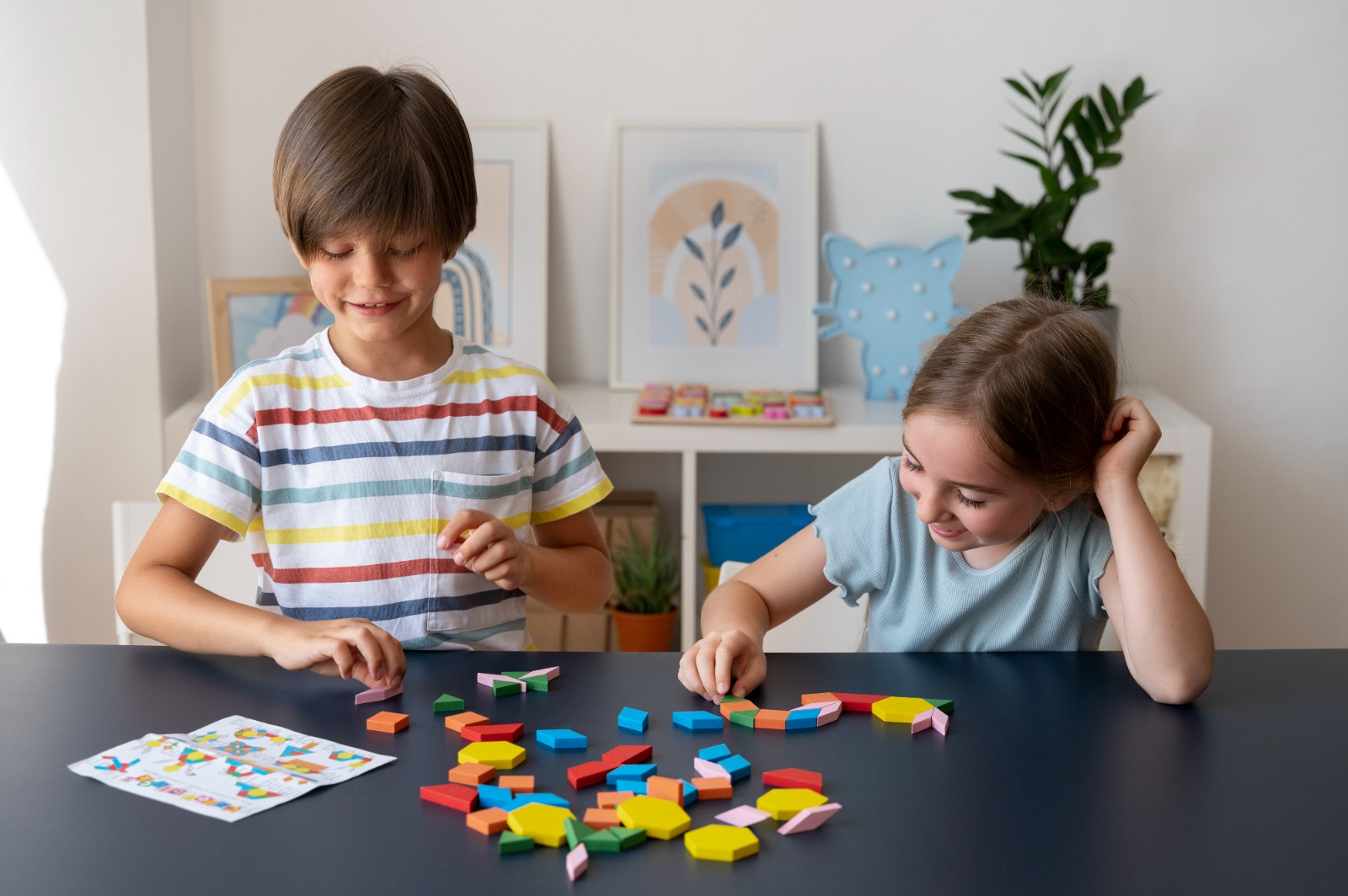
In this blog, we will share the ways to make your child engaged and attentive with the help of fun and interactive games that parents can easily play at home to teach children the concept of even and odd numbers from 1 to 100. These games blend learning with play, making math enjoyable while reinforcing number recognition, patterns, and logical thinking.
But before we begin with the fun games, let us first know about the need for learning even and odd numbers at such an early age.
Why Teach Even and Odd Numbers Early?
Before diving into the games, here are reasons why incorporating even and odd numbers is important for kids in preschool.
- Builds number sense: Helps children recognise patterns and structures in numbers.
- Introduces division and multiplication: Even numbers lay the groundwork for learning basic division (e.g., even numbers can be divided into two equal groups).
- Improves logical reasoning: Distinguishing between even and odd is a step toward developing analytical thinking.
At Rainbow Pre-School, we integrate such concepts into our early curriculum through activity-based learning.
Explore our preschool curriculum
To add to all of the above reasons, the earlier you make them learn numbers, the stronger their educational foundation will be. This will help them grasp numbers and numerical problems from the very early years of education.
Now, let us move on to the games that you can incorporate into your daily routine with your kids, where they enjoy learning with their parents, which will add to their educational experience.
Game 1: The Odd & Even Hopscotch
What You Need:
- Sidewalk chalk or masking tape
- A list of numbers from 1 to 100
How to Play:
- Create a large hopscotch grid using numbers from 1 to 20 (or 1 to 100 if space allows).
- Ask your child to jump only on the even numbers (2, 4, 6…) in the first round.
- In the next round, switch to odd numbers (1, 3, 5…).
- Make it competitive by timing their jumps or letting siblings race.
Learning Outcome:
Children will physically interact with numbers, reinforcing the concept while developing motor skills.
Parent Tip: Turn this into a daily 5-minute exercise to reinforce number sequences
Game 2: Even or Odd Treasure Hunt
What You Need:
- Number cards (1 to 100)
- Two baskets/containers labeled “Even” and “Odd”
How to Play:
- Hide number cards around the house or garden.
- Ask your child to find the cards and sort them into the correct baskets.
- Add challenges like “Find 3 even numbers between 30 and 50.”
Learning Outcome:
Enhances active learning and strengthens number sorting and recognition skills.
Learning through movement improves memory retention and focus in preschoolers.
Schedule a school tour to see learning in action!
Game 3: Number Buddy Match-Up
What You Need:
- Cutouts or flashcards of numbers 1 to 100
How to Play:
- Pair even numbers with their ‘buddies’ (e.g., 2 & 4, 6 & 8).
- Ask your child to find and match even-even or odd-odd number pairs.
- For older kids, introduce patterns like: “Find all odd numbers that end in 1 or 3.”
Learning Outcome:
Promotes cognitive skills like pattern identification, memory, and association.
Looking for expert guidance on preschool numeracy?
Join our next parent orientation program!
Game 4: Roll the Dice – Odd or Even Challenge
What You Need:
- A pair of dice
- Score sheet with two columns: Odd and Even
How to Play:
- Each player rolls the dice and adds the numbers.
- If the total is even, they score under the “Even” column; if odd, under the “Odd.”
- First to 10 points wins!
Learning Outcome:
Encourages quick mental calculations and categorisation of even/odd totals.
Bonus Variation: Add three dice for older children to increase complexity.
Game 5: Even-Odd Number Bingo
What You Need:
- Bingo cards with random numbers from 1 to 100
- Tokens or markers
How to Play:
- Call out numbers randomly.
- Instead of just marking them, ask kids to shout “Even!” or “Odd!” before placing their token.
- First to complete a row wins.
Learning Outcome:
Reinforces auditory learning and strengthens number recall.
Bingo is not just a game it’s a way to combine fun and focused number learning!
Game 6: Story Time with Numbers
What You Need:
- A creative story involving numbers
- Visual aids or finger puppets
How to Play:
- Create a story where even and odd numbers are characters—e.g., "Even Ellie" and "Odd Oliver."
- Introduce conflicts or challenges they solve using their number groups.
- Ask your child to act out scenes or draw what happens.
Learning Outcome:
Combines language development with numerical concepts.
Storytelling enhances imagination while reinforcing learning themes.
Game 7: Clap and Count
What You Need:
- Just your hands and enthusiasm!
How to Play:
- Count aloud from 1 to 100.
- Clap on every even number.
- Repeat the round but clap on odd numbers this time.
- Add variations like “stomp for even, jump for odd.”
Learning Outcome:
Great for auditory and rhythmic learners. Builds focus and sequencing.
Rhythm and repetition are excellent tools in early childhood education.
Reinforcing Even and Odd Numbers Through Daily Life
- Sorting socks or utensils: Ask, “Do we have an even number of spoons?”
- Car license plates: Spot even or odd numbers during a drive.
- Calendar fun: Mark even or odd days with stickers.
Everyday interactions can become powerful teaching moments.
Conclusion: Make Math a Game, Not a Chore!
With this, we can conclude that even the simplest task in making your kids efficient can be handled in a very fun yet systematic way. By doing these fun games and activities, the parents get to see their children become active, smart and happy.
There are numerous ways to make learning numeracy easier without burdening them with monotonous learning. Also, the involvement of parents, as we know, as the first gurus of their children, can make a huge difference in the lives of young ones.
Thus, teaching even and odd numbers doesn’t need to be a formal lesson—it can be part of your child’s daily play. By incorporating these fun, hands-on games, you’re not just building numerical skills, but also encouraging curiosity, independence, and joy in learning.
At Rainbow Pre-School, we value experiential learning and provide a nurturing environment where math and other subjects are explored through play and discovery.
Also, to know more about preschool education, learning methodologies, and admission, check out our previous blogs
Ready to give your child the Rainbow learning experience? Contact us today for admission details!
Frequently Asked Questions
What are even and odd numbers?
Even numbers are divisible by 2, such as 2, 4, 6, and so on. Odd numbers, on the other hand, cannot be divided evenly by 2 and include numbers like 1, 3, 5, and 7.
Why is it important for preschoolers to learn even and odd numbers?
Learning even and odd numbers helps children develop number sense, logical reasoning, and understanding of basic math concepts, laying the foundation for more complex math skills in the future.
How can I make learning even and odd numbers fun for my preschooler?
You can make learning enjoyable through interactive games like hopscotch, treasure hunts, number bingo, and storytelling that incorporate even and odd numbers, turning learning into an exciting activity.
What age is best to teach preschoolers even and odd numbers?
Preschoolers aged 4-5 years are typically ready to start learning even and odd numbers as they begin to grasp basic number concepts and patterns.
Can these games help improve my child’s math skills beyond even and odd numbers?
Yes, these games not only teach even and odd numbers but also help improve number recognition, pattern identification, fine motor skills, and cognitive development.

